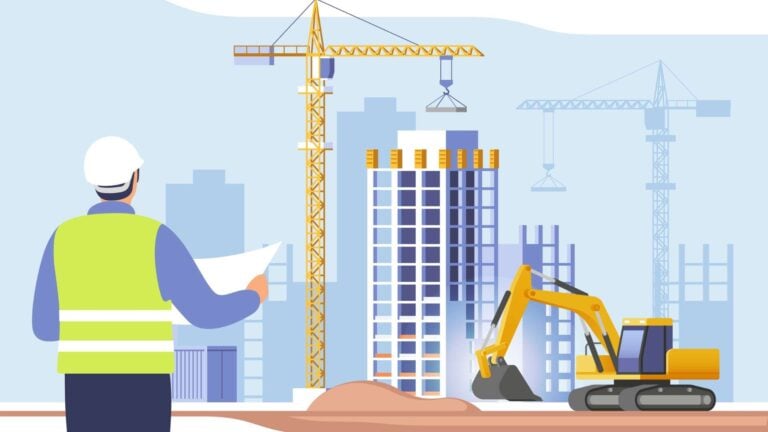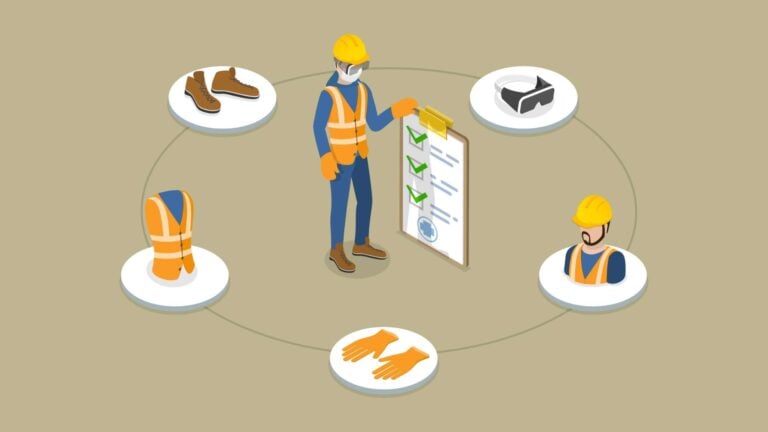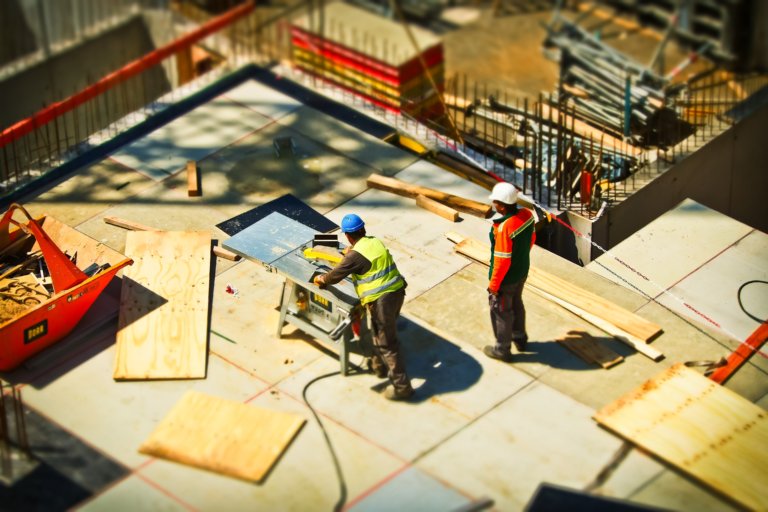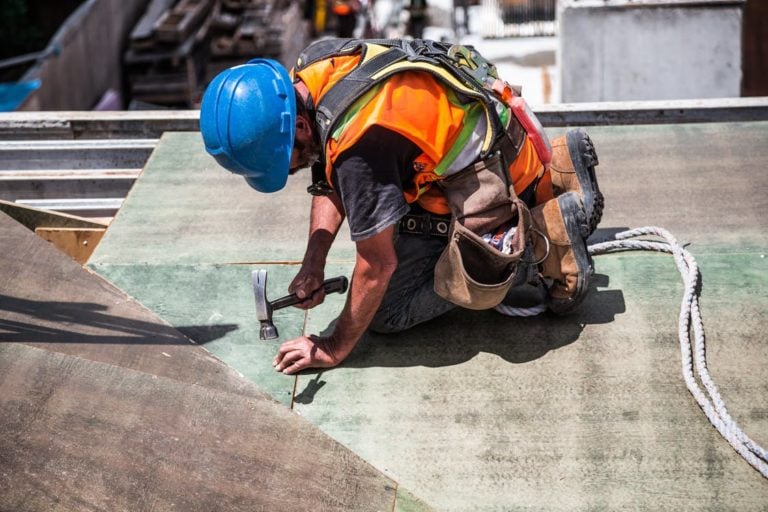Hiring the wrong construction workers can pose various risks to work quality, safety, team morale, and the overall success of a construction project. Below, we share essential interview questions to help you thoroughly assess construction workers before hiring them.
Construction workers can make or break the success of your construction projects. The wrong team members can lead to poor-quality work, project delays, health and safety hazards, and other issues, eventually damaging your reputation with customers.
That’s why you must thoroughly evaluate your construction workers before bringing them on board. Interviews are a great way to do this—but you need to ask the right questions.
Strong construction worker interview questions will help you understand your candidates’ backgrounds, career goals, technical skills, and more. This way, you’ll have every decision point you need to determine if they’re a good fit for the job.
In this guide, we share 30 effective interview questions for construction workers. These can give you a complete picture of your candidates’ profiles so you can make smarter hiring decisions for your construction company.
Key Takeaways
- Hiring unsuitable construction workers can lead to delays, quality concerns, safety hazards, and more.
- Interviews are a great way to vet candidates before onboarding them as construction workers.
- The best questions cover various topics—including work experiences, trade-specific skills, commitment to safety, decision-making, and behavioral attributes.
- Ask for concrete examples, use follow-up questions, and dig deeper during interviews to ensure you have an accurate picture of your candidate’s profile.
What Are Construction Workers?
Construction workers are individuals employed to carry out various tasks within the construction industry, such as building, repairing, and maintaining structures. They handle a wide range of responsibilities, including:
- Site preparation
- Operating machinery
- Laying foundations
- Installing structures
- Completing finishing touches
Construction workers can also include carpenters, electricians, plumbers, masons, laborers, and more—each specializing in specific aspects of the construction process.
Qualities to Look for in Good Construction Workers
Here are the key skills and attributes to consider when hiring construction workers.
- Prior experience in construction work, including familiarity with safety practices, building materials, construction methods, and relevant tools and machinery
- Physical strength, stamina, and agility to handle tasks that involve heavy lifting, working in various weather conditions, and participating in other forms of physical labor on construction sites.
- Precision and attention to detail to ensure accuracy in measurements, cuts, and installations.
- Effective communication and collaboration skills so they can work cohesively with others.
- Good time management skills so they can work efficiently and meet project deadlines.
- Relevant certifications or licenses, like Occupational Health and Safety Administration (OSHA) certifications, trade-specific licenses, and others. These may be necessary to ensure compliance and expertise in a particular area of construction.
🧠Did You Know?
Connecteam lets you store staff documents, licenses, and certifications in a central location. You can even set expiry dates to ensure relevant files are regularly reviewed and updated.
What Are Interview Questions for Construction Workers?
Construction worker interviews allow hiring team members to ask candidates questions about their backgrounds, technical skills, eye for detail, and other competencies necessary for the role.
Construction worker interview questions typically cover:
- Prior experience: These construction-related interview questions look at a candidate’s background and previous career in construction.
- Hard skills: With these construction interview questions, you can assess candidates’ technical expertise, such as familiarity with construction methods, equipment, safety regulations, and so on.
- Hypothetical scenarios: These types of construction interview questions evaluate a candidate’s approach to situations that resemble real-world challenges in construction.
- Behavioral questions: These interview questions for hiring construction workers help you understand candidates’ motivations, core traits, and attributes. This way, you can assess if they’re the right fit for your team
🧠Did You Know?
Your hiring team can collaborate on interviews using Connecteam’s task tracking app. You can assign tasks and subtasks, share feedback, add notes and files, and more. Plus, everything’s neatly organized in one central location.
Why Conduct Interviews for Construction Workers
Interviews provide several benefits to your construction worker hiring process. Some of these are listed below.
Verify their skills and experiences
Construction workers perform high-stakes jobs with financial, legal, and safety implications. It’s simply too risky to offer the job to a worker without any evidence that they have the skills for it. With construction-related interview questions, you can dive much deeper into candidates’ qualifications.
You can ask them to provide concrete examples of tasks or projects they’ve worked on and ask follow-up questions on anything unclear.
Finally, you can even have candidates perform practical exercises—such as reading an architect’s drawing—during the interview to test their level of expertise.
💡Pro Tip:
For top candidates with room to improve in a specific area, providing them with training during onboarding is always an option. Apps like Connecteam also have a company knowledge base that lets workers access training guides, videos, audio files, and more from anywhere.
Gauge their understanding of industry regulations and safety protocols
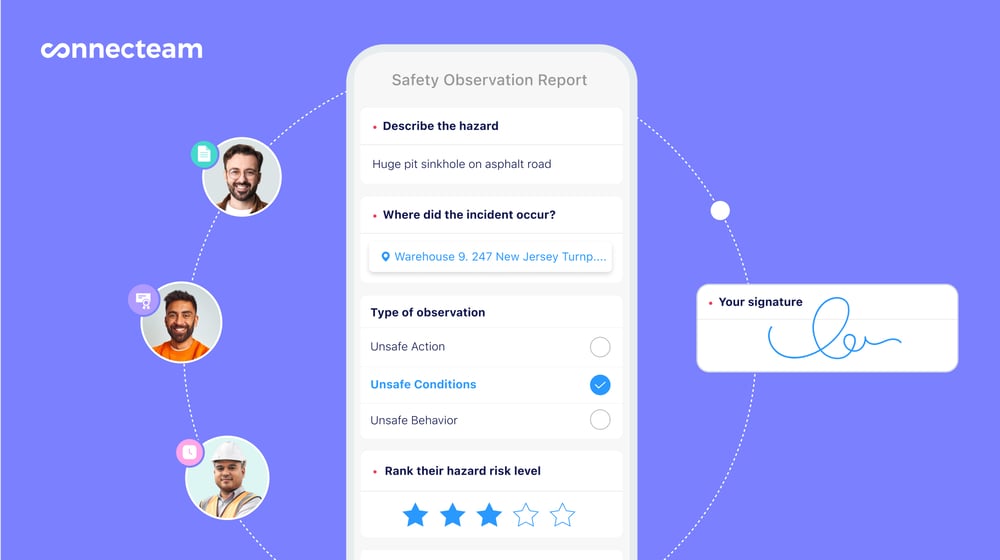
Adhering to safety guidelines is a major part of a construction worker’s job. Workers who don’t follow safety protocols put your customers and other team members at risk. Plus, you may be liable for legal penalties that could put you out of business.
Safety-related construction interview questions can help ensure your candidates understand best practices and are committed to building safe structures and maintaining a secure working environment.
📚This Might Interest You:
Checklists are an excellent way for workers to remember key safety tasks and update you in real time as they complete them. Learn about the best team checklist apps in our in-depth review.
Understand their working styles and preferences

Like other roles, construction workers may also have specific preferences around when and where they work. You can ask them about their time and location restrictions in the interview stages and see if their availability aligns with the role’s requirements.
Additionally, many construction workers work as 1099 contractors rather than full-time employees. This means they may have other professional commitments at the same time they’re working for you. You should ask them about this when they interview so you’re fully informed before making an offer. Plus, if you do hire them, this information will help your construction manager with scheduling.
🧠Did You Know?
Workers can update their location and availability preferences using Connecteam’s job scheduling tools. These can be considered when assigning shifts, helping prevent scheduling conflicts and last-minute absences.
Assess them for team and culture fit
Even a highly-skilled construction worker can fail if they don’t mesh well with the company and its culture. For example, a worker who’s constantly at odds with their team members will find it difficult to collaborate on tasks. This can impact productivity, work quality, and team morale.
Similarly, alignment with company culture and values is important, too. For instance, construction workers who don’t operate with your safety-first approach could put your company at legal risk and damage your reputation in the market.
By asking the right interview questions, you can get a clear picture of candidates’ personality traits, values, motivations, and more and ensure you hire someone who’s a great fit for your business.
30 Construction Worker Interview Questions and Ideal Answers
Here are 30 construction-related interview questions to help you assess construction workers thoroughly before hiring them.
Background and experience
- Share an example of a construction project you’ve worked on recently. What were your roles and responsibilities? How did you contribute to the project’s success?
- Elaborate on your experience with different construction methods and materials.
- Have you operated heavy machinery or specialized equipment? If so, which ones and for how long?
- Discuss your experience working with blueprints, technical drawings, and schematics.
- What additional training or certifications have you pursued in this field?
🧠Did You Know?
Connecteam offers employee timeline management. You can record your new hire’s start date, training history, certifications, and more on their personal color-coded timeline.
What to look for in ideal answers
Good candidates will have experience working on projects of a similar size and scope to the ones your company takes on. They’ll have a solid understanding of construction basics: methods, equipment, and working with drawings. The best answers will contain specific examples and discuss candidates’ roles in previous projects.
Candidates to avoid
Don’t settle for candidates who don’t have demonstrable experience or a basic level of expertise the role requires. Teaching new concepts is time-consuming and will cause delays in jobs with strict deadlines. Further, watch out for vague responses and a lack of concrete examples. This could mean that candidates aren’t being truthful about their experience.
Trade-specific skills
For carpenters
- What type of carpentry work do you specialize in—for example, framing, finishing, etc.?
- Describe your experience with precision cutting and measurements.
- Share an example of a project where you installed doors, windows, or other fixtures. What challenges did you face along the way, and how did you overcome them?
For electricians
- What experience have you had with electrical installations and wiring systems?
- What steps would you take to troubleshoot electrical problems on a construction site?
- Describe the most complex electrical system you’ve worked with and the challenges you faced during this job.
For plumbers
- What plumbing systems have you installed or repaired in your experience so far?
- What steps do you take to ensure proper connections and prevent leaks?
- Discuss your experience with drainage or sewage systems.
For Masons
- What experience do you have with different types of masonry work—for example, bricklaying, stonework, etc.?
- What steps do you take to ensure the structural integrity of your work?
- Have you worked on restoration projects? If so, describe what type of structures you worked on and how these projects differ from other construction work.
What to look for in ideal answers
The best candidates will exhibit a deep understanding of their specific trade—including core systems, use of equipment, and risk mitigation. Their answers will also show that they follow a clear, methodical approach to completing jobs. Finally, look for candidates who can answer your follow-up questions with ease and precision.
Candidates to avoid
Poor responses will contain inaccuracies and other mistakes, demonstrating a lack of knowledge in the trade. Watch out for candidates who seem to make up answers as they go along rather than explain their processes clearly and logically. Ask probing questions if you suspect they’ve memorized responses, and eliminate candidates whose answers aren’t up to the mark.
Safety and compliance regulations
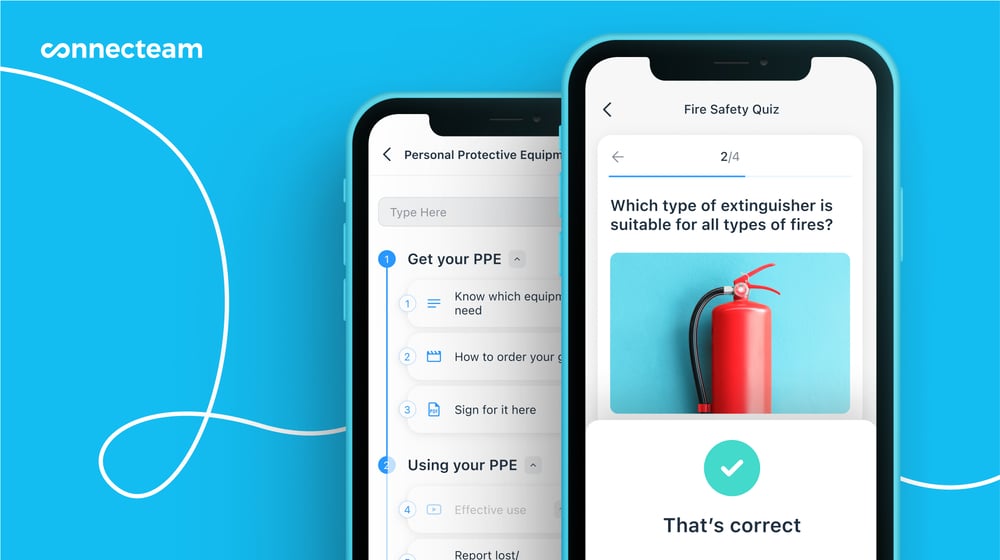
- How familiar are you with OSHA regulations? Can you share examples of how you’ve implemented them in the past?
- How do you ensure strict adherence to safety regulations on a job site?
- What measures do you take to prevent workplace accidents?
- Discuss the safety precautions you take when using specialized construction tools or operating heavy machinery.
What to look for in ideal answers
Ideal interviewees will have a strong grasp of relevant health, safety, and compliance regulations for their trade. Top talent will discuss regulations and show what steps they take to adhere to them.
Candidates to avoid
Don’t progress those who can’t speak about the regulations that apply to their line of work. Additionally, candidates who don’t take accountability for workplace safety—often relying on other team members—should be considered red flags.
📚This Might Interest You:
Discover 11 proven workplace safety tips to keep your team safe and secure.
Situational judgment
- Share an example of a challenging construction problem you encountered. What steps did you take to resolve it?
- Describe a time you had to make a quick, critical decision on a construction site.
- How do you handle unexpected changes to construction plans?
- Describe a situation where you’ve had a conflict or disagreement with a coworker. How did you resolve it?
What to look for in ideal answers
Strong answers will speak to the candidate’s ability to work through problems and develop creative solutions. Top applicants will also provide evidence of their ability to work under pressure, make quick and effective decisions, and resolve disagreements with coworkers professionally and objectively.
Candidates to avoid
Weaker candidates will struggle to think on their feet in the face of unexpected challenges. Further, they won’t be great at creating innovative solutions to typical problems faced in construction. Finally, watch out for signs that candidates are easily distressed by conflict and unable to work in a demanding environment.
Soft skills and attributes
- Describe a project where teamwork was essential to success. What role did you play in it?
- How do you prioritize tasks and manage your time effectively?
- How do you communicate project progress or challenges to project managers?
- What steps do you take to ensure accuracy and prevent mistakes in your work?
- How do you stay updated with industry advancements, tools, and techniques?
What to look for in ideal answers
The best interviewees will show a genuine passion and commitment to working in the construction space. Good candidates will also demonstrate that they’re effective time managers, have a strong eye for detail, and are good collaborators—all essential in the role. Lastly, give plus points to those who are up to date with the latest industry trends and take a keen interest in learning new ways of doing things.
Candidates to avoid
Steer clear of applicants who appear disingenuous in their passion for the job and don’t bother staying updated with the latest tools and technologies. You should also avoid candidates who can’t communicate effectively or manage their time well. Finally, watch out for those who can’t explain what steps they take to prevent, identify, and address mistakes in their job.
🧠Did You Know?
Connecteam’s online team chat is a great way for construction teams to communicate in real time. This improves productivity and also prevents errors such as missed or duplicated tasks.
Conclusion
Good construction workers are essential to your business’s success. They’re productive, work meticulously, and follow the necessary regulations. Without them, you may face missed deadlines, quality issues, legal concerns, and more.
That’s why assessing construction workers carefully before they join your team is so crucial. The 30 interview questions we’ve suggested can help you do this. Candidates’ responses will give you valuable insights into their skills, experiences, and behavioral traits—letting you make informed decisions about their suitability for the role. Use these questions as they are, or tailor them to your company’s needs for maximum impact.
FAQs
How can I assess my candidate’s abilities for physical labor in an interview?
Ask them about physically demanding tasks they’ve previously tackled. Also, assess their experiences with heavy lifting, prolonged standing, and working in varying weather conditions. Finally, ask them to discuss their approach to maintaining strength and stamina and what steps they take to adhere to safety protocols in physically strenuous environments.
How can I use interviews to promote work-life balance?
Interviews help candidates learn more about your company’s culture and values. Ask your interviewees how they maintain work-life harmony in highly demanding construction roles. Also, understand if they have any specific flexibility or time off needs so you can support them as needed.
🧠Did You Know?
Connecteam offers time off management tools to ensure your workers get enough time off, meal times, and rest breaks. This way, they get the downtime they need and you stay compliant with labor laws.
Should I tailor questions differently for various construction roles?
Yes, you should tailor questions to individual construction roles. You can ask all construction worker candidates some general questions about teamwork, communication, and decision-making. However, you should customize technical skills and proficiency questions to specific roles—like carpentry, electrical, plumbing, masonry work, etc. This ensures you can accurately evaluate your candidates’ suitability for their respective fields.

